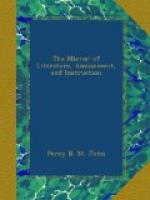Gower did not long survive his friend Chaucer. In the first year of the reign of Henry IV. he appears to have lost his sight; but whether from accident or from old age (for he was then greatly advanced in years) is not known. This misfortune happened but a short period before his death, which took place in the year 1402, about nine years after he had completed the “Confessio Amantis,” a work from whence he derived the honour of being ranked among the English poets.
The “Confessio” of Gower is said to have owed its origin to a request made to the poet by King Richard II.; who, accidentally meeting Gower on the Thames, called him into the royal barge, and enjoined him “to booke some new thing.” This, therefore, was not the first of his poetical productions, though it is universally admitted to have been his chief, and that on which his principal reputation depends; and into which “it seems to have been his ambition to crowd all his erudition.” It is, however, the last of the volumes, the titles which are painted on his monument in this church, and is supposed to be the last he ever wrote, at least of any important extent.
The poetical histories of Gower and Chaucer are intimately connected; yet there is a remarkable difference of opinion and pursuit in their respective writings. It must be confessed that to Chaucer, and not to Gower, should be applied the flattering appellation of “the father of our poetry;” though, as Johnson says, he was the first of our authors who can be said to have written English. To Chaucer, however, are we indebted for the first effort to emancipate the British muse from the ridiculous trammels of French diction, with which, till his time, it had been the fashion to interlard and obscure the English language. Gower, on the contrary, from a close intimacy with the French and Latin poets, found it easier to follow the beaten track. His first work was, therefore, written in French measure, and is entitled “Speculum Meditantis.” There are two copies of this book now in the Bodleian Library at Oxford. It contains ten books, and consists of a collection of precepts and examples, compiled from various authors, recommending the chastity of the marriage bed.
Gower’s next work was a Latin production, entitled, “Vox Clamantis,” of which there are many copies still extant. The unfortunate reign of the poet’s royal patron, and the rebellion of Wat Tyler, furnished Gower with ample materials for this publication.—The “Confessio Amantis” was first printed in the year 1403, by Caxton.
There is a Ms. in Trinity College, Cambridge, consisting of several small poems by Gower; but they are nearly destitute of merit. The French sonnets, however, of which there is a volume in the Marquess of Stafford’s library, are spoken of by Mr. Warton, who has given a long account of them, with specimens, as possessing more merit.
The “Boke of Philip Sparrow,” by the witty, but obscene Skelton, who wrote towards the close of the fifteenth century, says that “Gower’s Englishe is old;” but the learned Dean Collet, in the early part of the succeeding century, studied not only Gower, but Chaucer, and even Lydgate, in order to improve and correct his own style. By the close of that century, however, the language of these writers was become entirely obsolete.




